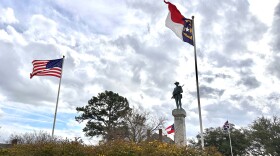A law in North Carolina that was written to make moving Confederate monuments nearly impossible will soon get its first true test.
The North Carolina Historical Commission is expected to decide as soon as early June whether Gov. Roy Cooper may relocate three Confederate monuments from outside the State Capitol.
Many observers are waiting for the commission's ruling with baited breath. They want to see whether the law is as impenetrable as its framers would like everyone to believe.
The community group Hillsborough Progressives Taking Action has helped students petition the commission to relocate a Confederate monument, known as Silent Sam, from UNC Chapel Hill's Campus.
The law in question is N.C. Statute 100-2.1, "The Protection of Monuments, Memorials, and Works of Art," which was passed in 2015.
According to the statute, the state historical commission must approve the relocation of any state-owned monument on public property. But there's no specific language in the law explaining who can and can't petition the commission, according to HPTAC member Heather Redding.

"I don't think the law was written with the intent of community members petitioning the historical commission," she said. "But it also doesn't say that we can't. And nobody seems to know who has the legal right to petition the historical commission."
Legal experts believe the person who owns the property where the monument is located is the only one who can petition the commission to relocate an "object of remembrance." But the statute is mainly untested. Also, there is the question of whether community members like Redding own the property on a public university.
This isn't exclusive to North Carolina, either.
Alabama, Virginia, Mississippi, Georgia, South Carolina and Tennessee all have similar laws with similar provisions and exemptions.
A common exemption in these laws is that if a monument poses a threat to public safety it can be relocated.
"Typically when there's a provision like that, it means that the building inspector said that, 'Oh this arch is about to fall over.' It relates to the physical state of the object," said Adam Lovelady, an assistant professor of public law at the University of North Carolina at Chapel Hill. "But with the demonstrations in Charlottesville and Durham, people are starting to question if this exemption applies to the people around the object."
Shortly after a deadly Unite the Right rally in Charlottesville last summer, Baltimore Mayor Catherine Pugh successfully used a public safety exemption to remove three Confederate statues and one of Chief Justice Roger B. Taney. Taney delivered the Dred Scott decision which ruled African Americans could not be considered citizens of the United States.
Governor Cooper has said UNC-Chapel Hill could also use a public safety exemption to relocate Silent Sam, but the university leadership disagrees.
Cooper is using a provision in the law that allows monuments to be relocated in order to preserve them. Lovelady said that provision was most likely intended to preserve monuments from natural disasters or decay.
"But, again, questions come up, especially with what happened in Durham," he said. "Is there a need to move an object in order to protect it from protestors? To protect it from vandalism?"
While officials like Cooper are hoping for a favorable interpretation of the law, leaders in other states are circumventing the law that protects their monuments entirely.
Memphis city leaders bypassed the Tennessee Heritage Protection Act by selling two public parks that housed monuments to Confederate president Jefferson Davis and Klu Klux Klan
Nathan Bedford Forrest ahead of the 50th anniversary of Martin Luther King Jr.'s assassination there in 1968.
"They sold both parks to us on December 20, 2018 for $1,000 each and we immediately removed the statues," said Van Turner, an attorney and director of Memphis Greenspace, which bought the parks. "We spent a lot of time ensuring what we did was 100 percent legal."

Despite the city's efforts to ensure it hadn't broken the law, the Sons of Confederate Veterans and the family of Confederate General Nathan Bedford Forrest are suing the city for this crafty legal maneuver.
"I can't think of a word bad enough to describe what they did," said Frank Powell, a spokesman for the North Carolina Chapter of the Sons of Confederate Veterans.
Powell's group is also amassing a legal fund to fight efforts to relocate Confederate monuments. It has billboards in the state soliciting donations to the fund.
If Governor Cooper successfully relocates the Confederate monuments outside the State Capitol he can expect a lawsuit from the Sons of Confederate Veterans, according to Powell.
"The law is very plain if you read it," Powell said. "It states that all objects of remembrance, which is what these memorials are, cannot be moved except under certain circumstances. And none of those circumstances have been met. So his petition is unlawful."
The chair of the historical commission said the committee deciding the fate of the monuments at the Capitol will have a decision in early June. The attorney representing the commission said its decision will be the final word.
But detractors have said any decision still has to be approved by two-thirds of the legislature.
That's just one more area of this law that remains unclear and untested.









